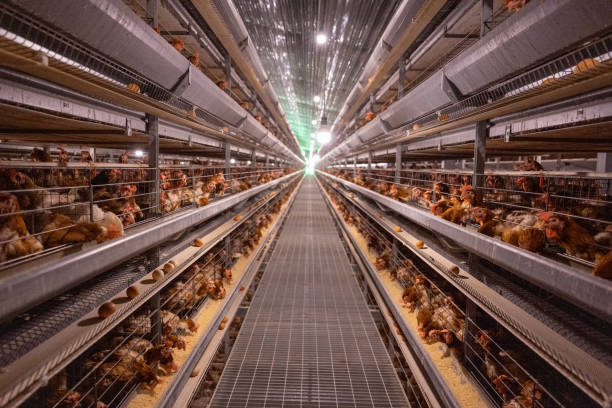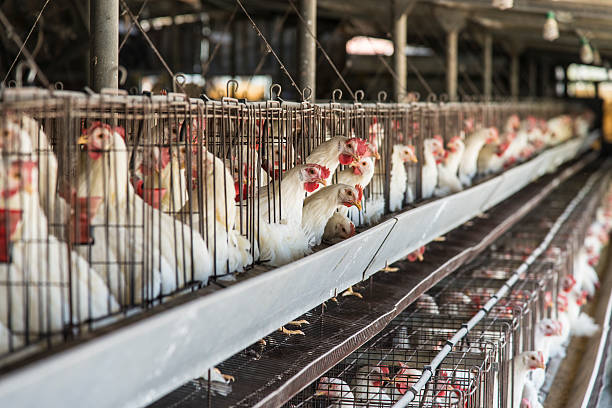
Organic Chicken Egg Farming Guide for Beginners
Organic Chicken Egg Farming Guide for Beginners

Starting an organic chicken egg farming business can be a rewarding and profitable venture. Whether you’re a small-scale farmer or someone passionate about sustainable agriculture, organic egg farming offers the opportunity to produce high-quality eggs while promoting animal welfare and environmental stewardship. In this guide, we’ll walk you through the essentials of setting up and managing a successful organic chicken egg farm, from choosing the right chicken breeds to managing feed, housing, and certification processes.
Understanding Organic Egg Farming
Organic egg farming differs significantly from conventional egg production. It emphasizes natural living conditions for the chickens, organic feed, and the absence of antibiotics, hormones, or synthetic chemicals. Organic laying hens must have access to outdoor space, be fed organic feed grown without synthetic pesticides or genetically modified organisms (GMOs), and be allowed to exhibit natural behaviors like perching, nesting, and dust bathing.
The demand for organic eggs has been steadily rising as more consumers become aware of the benefits — not only for health but also for animal welfare and the environment. If you’re considering this type of farming, it’s important to understand the regulatory standards for organic certification in your country, as these will dictate housing, feed, and management practices.
Transitioning to organic farming may take time, especially if you’re converting a traditional operation. However, the potential for higher market prices and growing consumer trust makes it a compelling choice.
Choosing the Right Chicken Breeds
Not every chicken breed is well-suited for organic egg production. When selecting breeds for your organic flock, prioritize those that are hardy, forage well, and have good egg-laying capabilities without requiring intensive confinement or artificial inputs. Some of the most popular breeds for organic farming include:
Hy-Line Brown: Known for high egg production and adaptability.
Australorp: Excellent layers, calm in temperament, and resilient to different climates.
Rhode Island Red: Hardy birds with high egg output and good foraging skills.
Plymouth Rock: Friendly and good for small to medium farms.
Orpington: A dual-purpose breed, good for eggs and meat, and adapts well to free-range environments.
It’s also essential to source chicks from certified organic hatcheries or trusted breeders who avoid using antibiotics or unnecessary vaccinations. Healthy, well-adapted birds are the foundation of any successful organic egg farm.
Designing Your Housing System

Providing safe, comfortable, and organic-compliant housing is a critical step in raising healthy laying hens. Organic standards typically require that birds have adequate indoor space, access to natural light, and outdoor access to roam and forage.
When designing your chicken house or barn, consider:
Ventilation: Good airflow is essential for bird health and disease prevention.
Lighting: Natural daylight or low-intensity artificial lighting to support natural laying cycles.
Bedding: Use organic or untreated materials like straw or wood shavings.
Perches and Nesting Boxes: Essential for hen well-being and egg laying.
Outdoor Access: Provide secure, rotating pasture systems to prevent overgrazing and protect soil health.
Mobile chicken houses or chicken tractors are a popular option for organic farmers who want to rotate grazing areas regularly. This method allows hens to naturally forage while improving soil fertility with manure distribution.
Feeding and Managing an Organic Flock
Organic egg production requires certified organic feed, which means no synthetic pesticides, herbicides, GMOs, or animal by-products. Most organic layer feeds are made from a combination of organic corn, soybeans, flax, and other grains that provide the necessary nutrients.

To ensure proper nutrition:
Balanced Diet: Provide a feed formulated to meet the calcium and protein needs of laying hens.
Supplement With Forage: Allow birds to eat insects, seeds, and greens from the pasture.
Clean Water: Use clean, fresh water sources throughout the day.
Health management is also crucial. Without the use of antibiotics, disease prevention becomes even more important. Maintain strict biosecurity measures, keep the coop clean, rotate pastures, and choose resilient breeds to minimize health issues. If a hen becomes sick, approved organic treatments must be used whenever possible.
Marketing and Selling Your Organic Eggs
Once your hens start laying eggs, the next step is finding a market for your product. Organic eggs can often command a premium price, especially when marketed directly through farmers’ markets, local cooperatives, health food stores, or online platforms.
To stand out:
Build a Brand: Develop a label and packaging that reflects your farm’s values, such as sustainability, ethics, and quality.
Get Certified: Work toward official organic certification if not already done. This will increase trust and marketability.
Educate Consumers: Share your story — how the eggs are produced, the welfare of your chickens, and the benefits of choosing organic.
Many customers are willing to pay more for transparency and quality. Don’t forget to build strong relationships with your buyers, get feedback, and continuously improve your process.
Starting an organic chicken egg farm is not only a business opportunity but also a way to contribute to a healthier planet and community. While it requires careful planning, commitment, and attention to detail, the rewards are well worth the effort.
If you’re just beginning your journey or looking to expand your existing setup, we’d love to help. Whether it’s choosing the right equipment, planning your housing layout, or understanding feed systems, our team at LIVI Machinery has supported farmers around the world in building efficient and sustainable chicken farming operations. Reach out to us today to learn more about how we can tailor a solution for your farm. Let’s grow organically, together.
